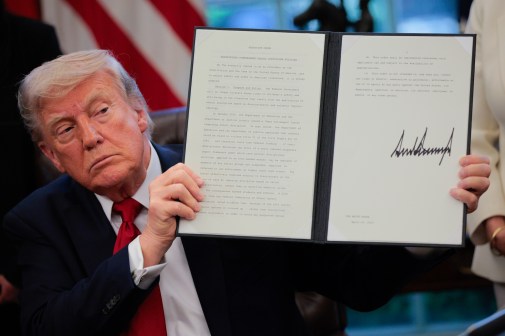OMB finalizes plan to save millions on mobile
The Obama administration intends to cut back on the more than $1 billion spent annually on governmentwide mobile devices and services by driving smarter purchasing habits, and reducing fragmentation and duplication of mobile contracts, according to a new Office of Management and Budget policy.
U.S. Chief Acquisition Officer Anne Rung, with U.S. CIO Tony Scott, introduced the final policy Thursday for the strategic procurement of mobile devices and services under category management, the government’s greater platform to streamline how it procures products and services as a more singular entity. The directive is the third in a series of IT-related category management policies, including those for hardware and software purchasing.
“The policy released today further leverages the Federal Government’s vast buying power by directing agencies to report all mobile service usage and pricing data to a centrally managed system, eliminating unnecessary inventory and services, and using government- or agency-wide solutions, if appropriate,” Rung and Scott wrote in a blog post.
Under the new policy, OMB requires agencies to report their mobile use and reduce unnecessary inventory on a quarterly basis; transition from individual service contracts to governmentwide solutions, particularly the General Services Administration’s Wireless Federal Strategic Sourcing Initiative blanket purchase agreement; and improve demand management practices by considering older and readily available devices that meet functional requirements to cut down on costs.
Rung and Scott said in March when the draft of the policy was released that it could save the federal government $230 million annually by reducing the nearly 1,200 contracts and more than 200 service plans for voice, data and text governmentwide — most of which tie back to the same four carriers in some way.
“The Federal Government cannot efficiently and effectively buy mobile devices and services if it does not have visibility into what it buys today or if it does not know what it needs to help fulfill agency missions,” the final policy reads. “Too often, agencies buy excessive levels of service, such as unlimited data and minute plans, when a lesser amount of data or number of minutes pooled across many thousands of users would meet the demands of the agency without risk of overage charges.”
The directive coincides with the work of a governmentwide Mobile Services Category Team that “is developing the next generation mobile strategic plan that incorporates the various requirements of Federal agencies domestic and abroad, and drives continuous competitive pricing to further reduce the total cost of ownership.”
In May, that team issued a request for information through the General Services Administration to explore the possibility of a governmentwide mobile services acquisition vehicle.
“This is a governmentwide, collaborative approach to discuss and create and shape mobility in the future in the federal government — not for today, but really with an eye toward a couple years from now — to see where are things going, what do we need to do, what do we need to create, what do we need to ask, what do we need to consider in terms of continuing to enable and account for mobility in the federal government,” Jon Johnson, a member of the MCST and enterprise mobility team manager at GSA, said in May at an industry day for the RFI.
[Read more: Governmentwide acquisition team seeks industry input on the future of federal mobility]
The team is tasked with developing by Oct. 31 “at least one next generation Government-wide acquisition solution” that will be awarded in May 2018. Agencies, with few exception, will be required to move their “”voice, data, and text requirements to one contract per carrier” on such a plan. Agency CIOs have until Nov. 30, 2016, to plan that transition.
Agencies have already saved $14 million this year and seen mobile prices drop by more an average of 30 percent “by awarding new contracts for mobile devices and services through GSA’s government-wide mobile strategic sourcing solution,” the blog post says.






